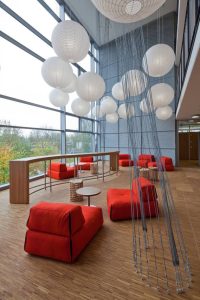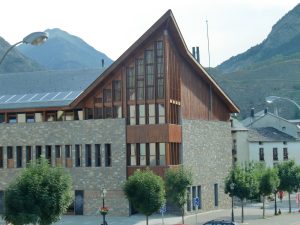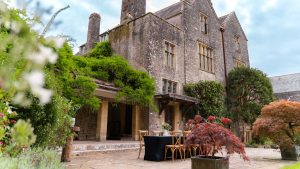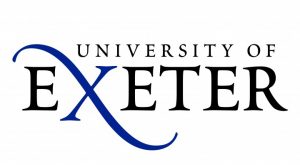The meeting agenda will be communicated internally.
The meeting will include a private meeting with the ESRs and the Project Officer Giuliana Donini to hear thoughts and feedback on the CriticalEarth project to date. Each ESR should prepare a presentation no more than 2 mins on their project.
The Management will then report on general progress.
The EGU General Assembly will take place in Vienna, Austria. See the EGU page, here. More information to follow.
There is a TiPES session entitled: Nonlinear Dynamics and Tipping Points in the Earth System: Convener: Niklas Boers. Co-conveners: Hannah Christensen, Peter Ditlevsen, Christian Franzke, Anna von der Heydt, Timothy Lenton, Marisa Montoya, Paul Williams, Naiming Yuan.
Session timing TBC
TiPES scientist Louise Sime will also give an Invited talk at EGU: “Diversity in Interglacials – past warm periods”.
We plan to hold a in-person TiPES Annual Meeting meeting later this year near Exeter area (UK). Please mark your diaries; more details of scope and timing will be announced in due course.

CriticalEarth Winterschool & Conference on Critical Transitions in observed and simulated complex systems:
Venue: Institute for Advanced Study (IAS) Technical University of Munich, Garching. Germany:
Meeting Agenda:
13-15 Feb: ESR workshop 2 “Methods of Stochastic Multiscale Dynamics” (Christian Kuehn)
16-17 Feb: Workshop 2 “Critical transitions in complex climate models” (Christian Kuehn)
18-19 Feb: Weekend Excursions to Alps/ Free time/collaborations
20-21 Feb: ESR workshop 3 “Data analysis and observations” (Niklas Boers)
22-24 Feb: Joint TiPES & CriticalEarth Conference on Tipping in the Earth System (Niklas Boers)
Meeting agenda details will be updated here in due course.
Purpose:
Introduction to communications with press and others through a hands-on workshop where we will quickly move from the abstract to each student’s individual plan. There will be a follow-up workshop at the end of the year when students are to attend the CriticalEarth-conference in Exeter, UK. In between the workshops in Vienna and Exeter individual projects will be discussed virtually.
Participants:
Students involved in Critical Earth Project.
Workshop leader:
David Trads, journalist and author, associated with Niels Bohr Institute at the University of Copenhagen.
Program:
09:00-9:30 Introduction: Why is it important to communicate science to outside world? And: How does it help your career if you’re good at it?
09:30-10:30 What is a ‘good story’? And: How does a reporter want? And: Why are news criteria important to understand?
10:30-11:00 Definitions of different target groups. And: How to use target groups.
11:00-12:00 What is ‘your’ good story? And: how to reduce complexity and make scientific insights accessible to broader audiences.
12:00-12:45 Lunch
12:45-13:45 Write a brief, popular blogpost. And: How to keep it simple! And: Learn to communicate your message quickly
14:00-15:00 How to improve a blogpost. And: How to maximize attention. And: Learn a few easy tools to express yourself in a simple, but precise manner.
15:00-15:30 Individual assignments & wrap-up.
TiPES Final Meeting
We welcome all TiPES and CriticalEarth members to the next (and final) TiPES meeting, which will take place from September 3rd-8th at the Centro de Ciencias de Benasque Pedro Pascual in Benasque, in the Spanish Pyrenees. All details are explained in the website: https://www.benasque.org/2023tipes/, here we just summarize the main steps to be followed:
 Now: Book your flight/train to Barcelona. Getting to Benasque by public transport is difficult, so the center provides a free bus from Barcelona to Benasque on the 3rd at 15:00 and back on the 8th at 9:00, making a flight out of Barcelona in the afternoon possible. Therefore, you are all expected to be in Barcelona by the 3rd and stay in Benasque until the 8th. Invited participants will get their economy travel reimbursed. Please read the instructions carefully and ask in case of doubt.
Now: Book your flight/train to Barcelona. Getting to Benasque by public transport is difficult, so the center provides a free bus from Barcelona to Benasque on the 3rd at 15:00 and back on the 8th at 9:00, making a flight out of Barcelona in the afternoon possible. Therefore, you are all expected to be in Barcelona by the 3rd and stay in Benasque until the 8th. Invited participants will get their economy travel reimbursed. Please read the instructions carefully and ask in case of doubt.
Before May 15th: Please fill in the Application form. We will then accept it and further information will be individually requested.
After acceptance, the registration fee must be paid to the account of the Centro de Ciencias de Benasque Pedro Pascual. You will need to pay individually following the instructions provided in the website (except for the invited participants).
May 20th-July 1st: Online hotel reservation will follow. We have pre-booked 50 rooms, including breakfast, lunch and dinner, at the Sommos Hotel Benasque Spa. For this we will pay individually onsite (except the invited participants). Here you will also notify any dietary restrictions.
Programme: On Tuesday 5th there will be a reception organized by the Pedro Pascual Centre. The scientific program will follow in the next few weeks. The first version of the program will be sent around by the end of May and updates will follow thereafter.
Objective: Provide a thorough overview of the scaling results which have been found in the climate system and the possible mechanisms behind this behaviour.
Specific Themes: origins of scaling, power laws, multifractal scaling
Relevance: Guarantees that the ESRs have adequate knowledge of this new paradigm of climate variability and be able to connect the results to clear climate dynamical processes.
 The programme will include the following:
The programme will include the following:
- Arrival Dinner – (Sunday evening, location TBC).
- ESR workshop 4 (EW4) “Scaling analysis in the climate system” (2 days) (Monday-Tuesday 4th and 5th December 2023)
- David Trads –Communications Workshop (0.5 day) (Wednesday morning 6th December)
- Social Activities/Excursion in local area (0.5 day) (Wednesday afternoon 6th December)
There will be a linked research workshop 3 (W3) “Early warning signals for critical transitions” (2 days) on Thurs-Friday 7th and 8th December; we will offer bus transfer to Exeter Thursday morning.


